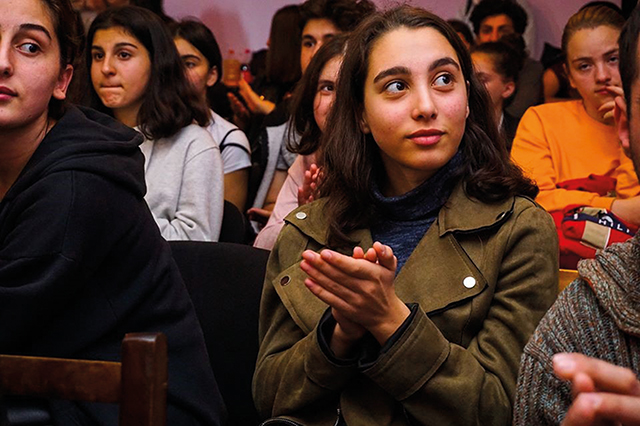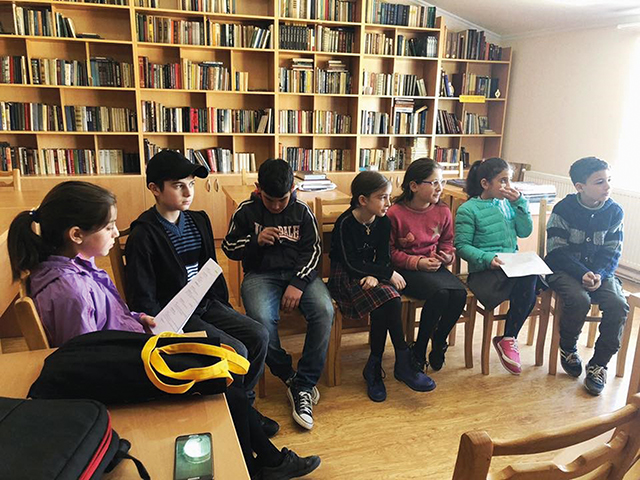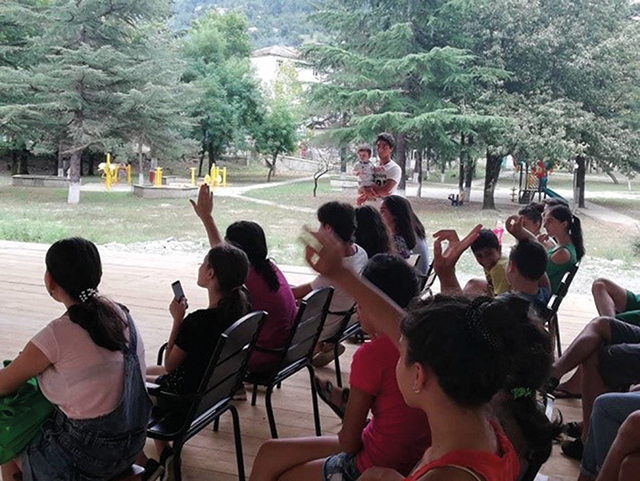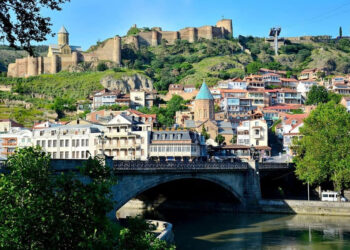CinéDOC-School is bringing outstanding documentary films for children and teenagers to different schools across Georgia. GEORGIA TODAY went to meet Ileana Stanculescu, project co-ordinator, to find out more.
“We started to work on a pilot project in 2020, when, because of the pandemic, cultural events simply did not take place or moved to the virtual space,” Stanculescu tells us. “The pilot project consisted of organizing online film screenings and discussions for pupils as part of our year-long CinéDOC-Young screenings. Children could not go out to cinemas anymore, because cinemas were closed or it was risky to have so many children in one space, so we had to reach children in a different way. The idea came in a rather natural way, and the pandemic pushed it to be realized.”
It was an idea they took to one of their top regional coordinators, Sopo Gogokhia, a teacher who is used to organizing mini festivals and film screenings in the town of Chkhorotsku. Together with her and with the Coalition Education for All, the CineDOC team developed a pilot project, first aimed at reaching pupils from Chkhorotsku and Tbilisi, then reaching out to more and more schools from the regions.
“It went so well that we began considering including more schools and involving more teachers,” Stanculescu notes. “But we had to find a way of doing it so that teachers organized the screenings themselves, otherwise the project had no chance of growing.
In 2021, they published a Call for Teachers, those interested in screening and discussing documentary films in class. They received applications from 67 schools from all across Georgia and immediately understood the potential of the project. Many of the teachers who applied are civic education teachers, others teach history or literature; even a teacher of mathematics applied.

“We re-built our website, so that teachers can have access to films via a password-protected online video library. Our online platform for schools includes virtual cinemas, which can be accessed by children during online screenings. Once the pandemic is over and pupils are back in class, teachers have the possibility to simply stream the films directly from our website,” she says.
What is the CineDOC School mission, and who is supporting it?
The mission of the project is to bring good, engaging, creative documentary films to young audiences, while involving them in discussions on different topics of social interest. But the selected films are not only reports about certain topics: they are cinematic films that have strong stories, films with protagonists that go through some hardship, or manage to achieve their goals.
Children can identify with the protagonists of the documentaries. While developing critical thinking, they will be also exposed to the lives and stories of children from all across the world: from Venezuela to Japan. Such documentaries have the potential to increase empathy, and to promote positive social interaction. Last but not least, watching beautifully shot and edited films, as well as animated documentaries, positively impacts the social-emotional growth of pupils and understanding of the world around them.

We are very lucky that this project is supported by the Swiss Agency for Development and Cooperation, for which quality education and civic education are core priorities. From this spring, we will also again have the Creative Europe Program of the European Union as co-donor.
As we organize training sessions for the selected teachers, we also invite guest speakers from other European countries. For example, guest speakers that represent the project One World in Schools, a documentary film screenings project in the Czech Republic that reaches out to teachers and pupils from more than 3,900 primary and secondary schools there.
Who chooses the films and which films are shown?
Within our team, we choose and discuss the selection of films from our large archive of documentaries that have been screened at our festival to date. But we have also started to add new titles. Our festival has had a competition for children called CinéDOC-Young, since its first edition in 2013, meaning we can look back to some experience in programming films for young audiences.
In addition, we invited the selected teachers to join online film screenings and Q&A sessions with filmmakers during our 2021 edition. Many of the teachers were impressed by films selected for the Focus Caucasus competition. We asked them to make a list of films they would like to screen in class. After that, taking into account their preferences, we included their preferred films in our selection too.
What is very important for us is that all the selected films have an extraordinary visual style; that they are little pieces of cinematic art. Some films are animated documentaries, suitable for younger children.

We are really glad to have been able to purchase screening rights to a series of short documentaries called “Kids on the Silk Road”. “Kids on the Silk Road” is 15 stories about children between the ages of 11 and 14, from 15 countries along the old silk route. Each story shows how the individual child deals with life’s challenges, big and small, which they face in their specific cultural and social contexts.
What’s the duration of the project?
We will implement this project at least until 2025, and we hope that we will be able to implement it later on too, especially if teachers are able to screen films independently from us. Once the video library is established, with some films purchased for a longer period of time, the teachers can easily continue to screen films without our direct assistance.
Can you give us one or two examples of success stories within this project, or highlights, or moments which touched you?
There were innumerable moments during which we were really happy with the results, especially when the discussions with pupils lasted more than one hour, when you see that many of the teenagers and children were so glad to discuss, to share their opinions, to ask questions about the films. Sometimes children have analyzed films in better and deeper ways than any grown-ups could do. When the film directors were present at the online discussions, they had so many questions and so many thoughts to share with them.
We also conducted a survey after a certain number of screenings, in order to receive some written feedback from participating pupils regarding the films, the discussions, and overall format of the project. All of the surveyed pupils expressed their wish that this project continues; some of them have written us that they wanted to be able to watch such films more often; others wrote us that they would like to also learn filmmaking and to work on short documentaries themselves.
What role do the school teachers play in the pre/post film screening? What has the feedback been like and how can schools get involved?
The role of teachers is essential, especially during the pre- and post-screening discussions. The teachers moderate the discussions with the pupils, they put the right accents, and they bring certain topics to their civic education, arts, literature or history classes that films can highlight in a wonderful way.
But teachers are not only important during the discussions: they also advise us on which films to select, which films are suitable for which age groups and which films we could add to our video library.
For example, teachers were impressed by an animated documentary from our archive. The film deals with the destiny of Lithuanians who were deported to Siberia during Soviet times. The film is told from the point of view of a grand-daughter who discovers old letters and photos taken by her grandparents in Siberia. While the story is really sad, the film is made in a light way, and it is almost like a cinematic fairytale.
If schools want to get involved, they can contact us anytime, by sending us an e-mail to: cinedocschool@gmail.com. Our colleague, Keti Tsirikidze, will be happy to answer all questions and to inform potentially interested teachers about this year’s new call for applications.
What are the plans and goals for the future?
We have many plans and ideas for the future. One of them is to establish cinema clubs at the participating schools. Some of the schools have already started with this activity. Cinema clubs could be like small, independent initiatives run by pupils and teachers. They could also apply for co-funding from local authorities and organize “Film Summer Camps”, for example. We will support them with films and, if possible, also with documentary directing training sessions for children.
Another fun activity will be dubbing: we will invite pupils from different schools to a casting and select them to dub the newly added titles in Georgian, Armenian or Azeri, depending on the region of the participating schools. Dubbing films is always very enjoyable and fun, and is also a film literacy activity that increases the motivation of children to watch documentaries.
Last but not least, we plan to cooperate with organizations from Europe that are active in this field, such as the Finnish Valve Film School for children. The plan is to organize common screenings and common discussions during which children from Georgia and children from Finland will discuss films together, in online sessions. And, once the pandemic is over, we also hope to be able to visit, together with selected pupils and teachers from Georgia, the Oulu International Children’s and Youth Film Festival in Finland.
Interview by Katie Ruth Davies














